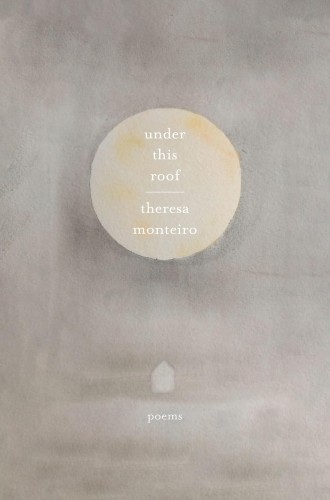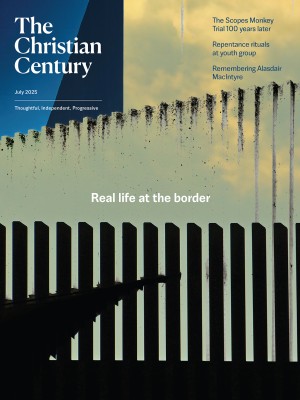Life’s mysteries, juxtaposed
Theresa Monteiro’s debut poetry collection delivers a cosmic vision that always bursts through the mundane.

Under This Roof
Throughout Theresa Monteiro’s debut poetry collection, we’re offered striking images for a sense of life’s mysteries. Sometimes it’s in the wonder of the most ordinary circumstances, as in the poem “From Inside the Whirlwind”:
Or watch, with a child’s
small joy, as the ring around
the number four lights up
when you press it—
feel the elevator
loft you up,
holding all your weight.
But often it’s through unexpected juxtapositions that Monteiro evokes life’s mysteries. So, for instance, the poem “Solomon Says” moves from the biblical quotation “Wisdom is more mobile than any motion” to “Mama’s gotta / fry an egg while she spells / cantaloupe.” And in “Topography of Another April,” the poet asks:
Read our latest issue or browse back issues.
How did we travel
From the tunnel of a brain scan
to a woman in a tent selling
skeins of woolen yarn
the color of nectarines, varied?
In "Who Sees," Monteiro helps readers notice:
Below the power lines
only two squirrels
see the mail carrier step
Over a sidewalk chalk drawing.
He drives his mother to the salon
every Friday.
These surprising juxtapositions are delightful. They evoke a sense of life’s wondrously unforeseen connections.
We’re treated to such a surprise again in the book’s title poem, in which a mother, after she “scrubs each child clean,” sends her children
on their way
where they find no paralegals
among the Church Triumphant.
They’ve left pencils and
neckties on the ground. Traded them
for singing
This poem, the book’s longest, has five sections. The first features a literal roof, and “under this roof / recessed lights flicker above / a table where a couple eats / their shadowy veal.” Shadowy veal? This bizarre image makes me smile.
In the poem’s next section, we move from blood in our body to a flooding basement via the rhyming of blood and flood:
Poets claim a broken heart . . .
Something strange between the lungs,
communicator of murky
blood inside a woman, in a basement,
flooding. The woman watches it fill.
The next section of the poem is set in the Middle Ages, when “monks thread pages / summas, silent” and “Aquinas sighs—This work is straw.” (“All that I have written seems like straw to me,” Thomas Aquinas reportedly said near the end of his life.) Monteiro moves from Aquinas’s straw into the adjacent image of a stable, where “a heavy cow / shelters her calf against / her milky belly, lowing / on a bed of straw.”
The fourth section of “Under This Roof” shifts from Dante’s Purgatorio to the paralegals and neckties that appear (as quoted above) when a mother scrubs her children. The poem’s final section plays with a supposed prohibition against using the word behold in contemporary poetry. Monteiro teasingly defies the prohibition: “But—behold the moon! / don’t just look— / hold your gaze, see?” After pulling hold out of behold, Monteiro ends the poem by merging two unrelated biblical allusions:
See the brightness of arterial blood—
seventy times seven thread
through the eye of the needle
opened wide.
We know that “seventy times seven” is the number of times Jesus says we must forgive someone who has sinned against us (Matt. 18:22). And going “through the eye of the needle” comes from Jesus’ saying about how hard it is for a rich person to enter the kingdom of God (Mark 10:25). The fun here is in Monteiro’s taking the phrases out of context to create a playful composite image.
Monteiro’s epigraph for the title poem—Joan of Arc’s question “How else would God speak to me, if not through my imagination?”—could be the epigraph for the entire book. That Monteiro does indeed hear God speaking to her is reinforced by other biblical references—and even more so by what I’d call her cosmic vision.
What’s remarkable about this vision is that it always bursts through the mundane. In “New World Symphony,” for instance, a Dvořák symphony is “shaking / our house, above our town, / through blue atmosphere / and black space.” And later in the poem:
Imagine the music
from an immigrant’s hand
moving eternally through galaxies
and, maybe, all the way
to a black hole.
A similar sense of revelation unfolds in the final lines of the book’s final poem:
Because my father knows the difference
between the rocky shoreline
and the view from his porch, is nothing
compared with the distance between that ocean
and the stillness that’s to come.
The cosmic in the mundane, strikingly unforeseen juxtapositions evoking life’s mysteries, and all this in poems that delight even as they stretch our minds: these are the gifts of Monteiro’s debut volume. I look forward to her next collection.






